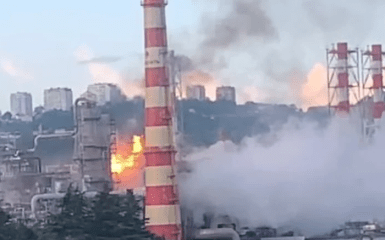A fire broke out at an oil refinery in the Russian city of Tuapse after a nighttime drone attack.
Oil refinery attacked by two UAVs
On 17 May, two UAVs allegedly attacked an oil refinery in Tuapse in the Krasnodar Krai region of Russia that caused a fire at the refinery.
The operational headquarters of the region reported that the plant was allegedly attacked by two drones, special services had already localised the fire.
The Russians traditionally blamed the Ukrainian Defence Forces for the attack.
According to preliminary information, there are no casualties. Local residents report interruptions in communication in Tuapse.
Unprecedented attack on Russia
Ukrainian expert on international energy and security relations, president of the Center for Global Studies "Strategy XXI" Mykhailo Honchar explained the details of night fires and explosions in Russia.
More than a hundred UAVs and a certain number of maritime strike drones were involved in a complex combined attack in two environments on a number of infrastructure facilities in the occupied Crimea, as well as in Novorossiysk and Tuapse! This is the first time! And it's absolutely unprecedented! The orcs have never had such a massive scale. You cannot even imagine how difficult it was for the planners and executors of this large-scale operation! Sincere admiration! Keep up the good work!

Mykhailo Gonchar
President of the Center for Global Studies "Strategy XXI"
Mikhail Honchar noted that the Tuapse refinery, which was damaged on the night of 24-25 January, only started operating in early May after more than 3 months of repairing the main ELOU-AVT-12 unit, and even then not at full capacity.
In January 2024, the plant was attacked by the Security Service of Ukraine (SSU) drones. The primary oil processing unit, namely the vacuum and atmospheric columns, was damaged. At that time, Ukrainian drones managed to damage the Russian ELOU-AVT-12 unit (ELOU-AVT: electric oil desalination and dehydration unit, atmospheric and vacuum distillation).
UAV attacks on Russian oil refineries — what is known
Since the end of January, Ukraine has been regularly striking oil refineries in Russia with long-range drones.
In total, the SSU carried out at least 13 successful attacks on Russian refineries, stated the head of the SSU, Vasyl Malyuk.
According to him, thanks to this, oil production and processing in Russia decreased by 12%. He emphasised that revenues from the export of petroleum products make up a third of the Russian budget and the "lion's share" of the military budget.
It is known about strikes on the following enterprises:
Tuapse Refinery, January 24
Volgograd Refinery, February 3
Afipsky Refinery, February 9
Illinsky Refinery, February 9
Refinery Lukoil-Nizhegorodnaftoorgsintez, March 12
Ryazan Refinery, March 13
Kaluga Refinery, March 15
Syzran Refinery, March 16
Kuibyshevsky Refinery, March 16
Slavyansk Refinery, March 17
Novokuibyshevsky Refinery, March 23
TANECO Refinery, April 2
Ilsky Oil Refinery, April 27
Slavyansk Refinery, April 27
Ryazan Refinery, May 2
Refinery Gazprom Naftokhim Salavat, May 9
Kaluga Refinery, May 10.
More on the topic
- Category
- Ukraine
- Publication date
- Додати до обраного
- Category
- Events
- Publication date
- Додати до обраного
- Category
- Ukraine
- Publication date
- Додати до обраного
Drones have attacked Rosneft's Tuapsyn Refinery before




